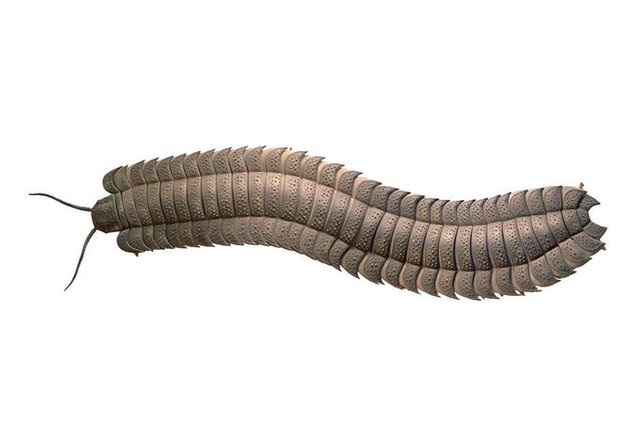Arthropleura was the largest millipede ever to live, and palaeontologists have just found the fossilised remains of the longest specimen yet on a beach in northern England

Reconstruction of the giant millipede Arthropleura, which lived 326 million years ago
Neil Davies
The remains of a 326-million-year-old giant millipede, known as Arthropleura, have been found on a beach in Northumberland in the UK. With a length of more than 2.5 metres, Arthropleura is the largest arthropod – invertebrates with jointed legs, such as scorpions and crabs – ever to have existed on Earth. The new specimen appears to be the biggest found to date.
In January 2018, Neil Davies at the University of Cambridge and his colleagues stumbled across the fossil by chance on Howick Beach in Northumberland during a geological tour of England and Wales.
“We saw that there was a very large piece of sandstone cliff that had fallen off and it had split down the middle as it fell,” says Davies. “We had a quick peak inside the crack that had formed and saw that there was a really large fossil inside there.”
After extracting the remains, they determined that the fossil was a segment from the rear of Arthropleura. This section was around 76 centimetres long and 36 centimetres wide. The team then calculated that the creature must originally have been 2.63 metres long and 55 centimetres wide.
“We can estimate they are the largest arthropod to have ever walked on Earth,” says Davies. It was potentially even bigger than the largest eurypterid, or sea scorpion, which lived around the same time as Arthropleura.
The environment in which the fossil was found was different to what the researchers had expected. “It comes from a sandy delta environment, rather than a coal forest that [Arthropleura] is often illustrated as living in,” says Davies.
They also dated the fossil to the early Carboniferous period, making it much older than the only other two Arthropleura fossils yet found, which were discovered in Germany a century ago.
This also predates the rise in atmospheric oxygen around 300 million years ago that has often been cited as the reason these millipedes were so large, which suggests a need to rethink how these creatures may have evolved.
“There’s plenty of things out there left to be discovered, even in places where people have looked many times before,” says Davies. “When you find these things, it builds a picture of the alternative kind of Earth that that existed in the past.”
Journal reference: Journal of the Geological Society, DOI: 10.1144/jgs2021-115
Sign up to Wild Wild Life, a free monthly newsletter celebrating the diversity and science of animals, plants and Earth’s other weird and wonderful inhabitants